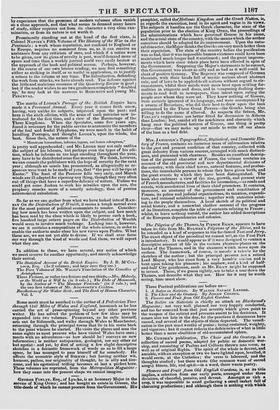GEORGE FINLAY, Esq., of Lyikha, is an honorary Major in
the service of King OTHO ; and has bought an estate in Greece, the title-deeds of which he cannot procure from the Government. His pamphlet, called the:Hellenic Kingdom and the Greek Nation, is, as regards the execution, local in its spirit and vague in its views. The subjects it handles are the Greek character, the state of the population prior to the election of King Onto, the proceedings of the administrations which have governed Greece in his name, and the actual state of the country,with the means which the author conceives should be adopted for its improvement. Upon the natu- ral character, theMajor thinks the Greeks are very much better than their reputation. The state of the country before the pacification was so bad, that it was impossible human existence could have been maintained much longer had it continued ; and the great improve- ments which have since taken place have been effected in spite of the Government. Supposing the Major's statements to be correct, this Government was about as silly and as bad as it well could be short of positive tyranny. The Regency was composed of German theorists, with their heads full of mystic notions about abstract rule, and of laws to be applied to all nations without regard to cir- cumstances, whilst their minds were more bent upon settling for- malities in etiquette and dress, and in composing dashing docu- ments to read well in newspapers, than intent upon ruling the people over whom they were set. They knew nothing of Greece, were entirely ignorant of its language, and were accompanied by a swarm of Bavarians, who did their best to draw upon the loan guaranteed by the Three Great Powers—the Greeks being also willing to do the same if allowed. As respects the future, Mr. FINLAY'S suggestions are better fitted for discussion in Athens than London; but, amidst all the murkiness and obscurity which hang over the ;political horizon of Greece, one thing is pretty clear—that we may make up our minds to write off our share of the loan as a bad debt.


























 Previous page
Previous page